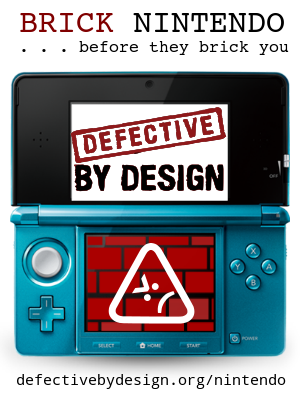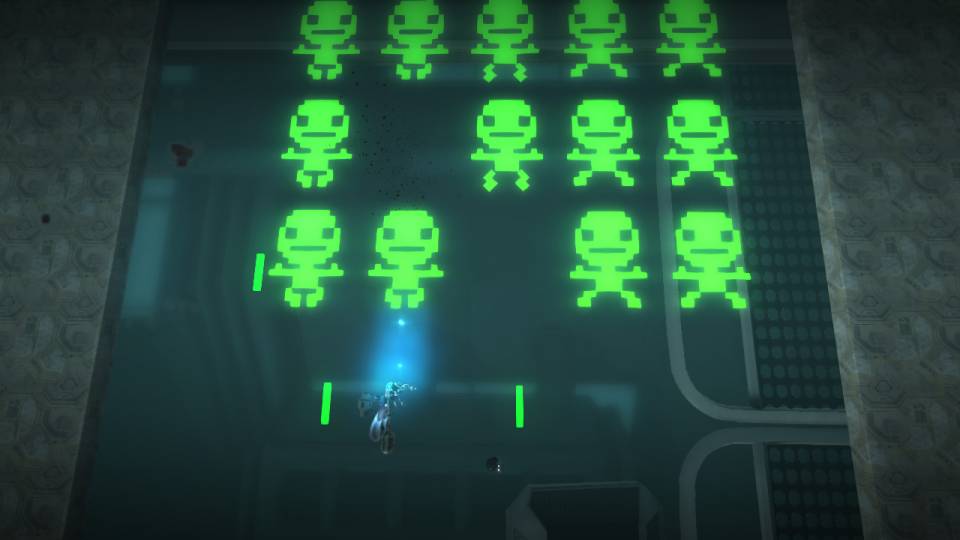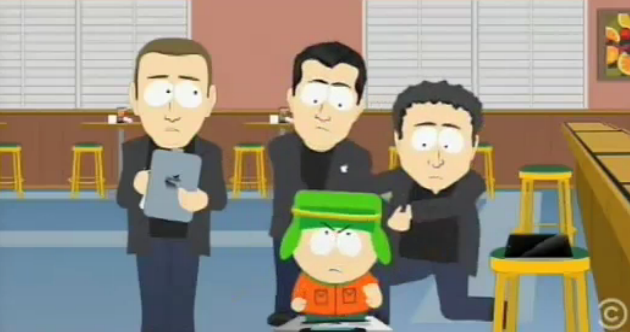
200 cardboard bricks are en route to Nintendo of America president Reggie Fils-Aime to send a message. It's part of a "Defective by Design" campaign from the Free Software Foundation calling attention to Digital Rights Management (DRM) and fighting against what it considers unfair DRM policies. The campaign generated headlines last week for pointing the finger at Nintendo's policies for 3DS.
All hardware and software comes with legal copy that most skim past, far more interested in consuming what they paid for. Hell, South Park just lampooned society's disposition towards passively accepting whatever corporations put in front of us, as long as the product is good enough. It was hard to take Defective by Design seriously, given it's an advocacy group with a clear agenda. Nintendo has an agenda, too, but is it anti-consumer? I'm someone who clicks "I agree" like most of you, but I also wanted to know more.
Defective by Design was upset for several reasons, including Nintendo claiming massive rights over content created by users on 3DS, including photos and videos. Here's the passage about copyright, lifted directly from the 3DS' End User License Agreement on Nintendo's website:
"By accepting this Agreement or using a Nintendo 3DS System or the Nintendo 3DS Service, you also grant to Nintendo a worldwide, royalty-free, irrevocable, perpetual, non-exclusive and fully sublicensable license to use, reproduce, modify, adapt, publish, translate, create derivative works from, distribute, perform and display your User Content in whole or in part and to incorporate your User Content in other works, in any form, media or technology now known or later developed, including for promotional or marketing purposes."
User content, in Nintendo's words, means "messages, images, photos, movies, information, 3DS user names, Mii, Mii nicknames, names of creators, and other names." It's a broad scope. In laymen's terms: Nintendo has a license to the content you've created and do, well, stuff with it.
"The Nintendo 3DS is a useful target for our campaign because the Nintendo Terms of Service state so clearly what kind of power they believe they deserve to yield over a user," explained Defective By Design campaign manager Joshua Gay to me in a recent email. "This does not make them any better or worse than Apple, for instance, but, Nintendo does make our job a little easier in some ways, since we can simply quote their own Terms of Service to show the world just how awful they are. This is an important aspect of the Defective by Design campaign--making as many people as we can aware of DRM technology and presenting our case as to why we believe it needs to be eliminated."
Legalese seems scary because it's tough to understand what it means. What sounds strangely demanding may have more to do with the company in question covering their ass--and yours. Or maybe not. Maybe corporations adopt such strict and impenetrable language to allow themselves more room to enforce rules as situations call for it. I'm not an expert, just a reporter shooting from the hip. Luckily, it's not that hard to get in touch with people who know much more than I do.
== TEASER ==
Defective by Design is attacking Nintendo and others for many reasons, but since so many games incorporate user content, to make better sense of this, we're going to focus in on the rights of corporations over the content you create within their experiences, hardware or software. There is a significant difference between "own" and "use," as a gaming versed lawyer I spoke to clarified.
"The initial issue is separating copyright ownership from a copyright license," said Andrew Ehmke, an attorney at Haynes and Boone. "The ability to use the content (a license) is different than owning the content (the owner can stop other people from using). Most terms of service that cover user-generated content will include language that effectively states that the company can use the user-generated content--although, the extent of the use will vary significantly."
Ehmke said I'd find similar language in both Microsoft and Sony's own user agreements. And?
Yup.
What if you make stages in LittleBigPlanet...?
"In addition, you will have the option to create, post, stream or transmit content such as pictures, photographs, game related materials, or other information through PSN [PlayStation Network] to share with others (User Material), provided no rights of others are violated. To the extent permitted by law, you authorize and license SCEA [Sony Computer Entertainment America] a royalty free and perpetual right to use, distribute, copy, modify, display, and publish your User Material for any reason without any restrictions or payments to you or any third parties.
...or make a game mode in Halo: Reach's Forge mode?
"With respect to content you post or provide, you grant to those members of the public to whom you have granted access (for content posted on shared and private areas of the Service) or to the public (for content posted on public areas of the Service), and, in either case, to us, free, unlimited, worldwide, nonexclusive, perpetual, and irrevocable permission to: use, modify, copy, distribute, and display the content in connection with the Service and other Microsoft products and services; publish your name, Gamertag, or other information you supply in connection with the content; and grant these rights to others."
That all sounds awfully intimidating. No one could blame you for not knowing what the hell the above statements actually means, wondering for a moment if game companies are tricking you into giving up your rights, and deciding to just move on and play the game you just bought.
"How often do terms of service that address UGC [user generated content] then also include language giving the company the ability to use that UGC?" asked Ehmke. "The answer is almost all of them."
Still sounds scary, but as Defective by Design suggests, are companies taking advantage of you?
"I agree also that the contractual language within the ToS [terms of service] of not just the 3DS but most gadgets are somewhat scary when translated into laymen terms," said Electronic Entertainment Design and Research analyst Jesse Divnich. "However, some of the suggested implications made in regards to the 3DS ToS are pretty farfetched. Nintendo is not going to steal your pictures for their own use. I don’t care what the language says, Nintendo won’t conduct in such a manner."

Naturally, Defective by Design holds a slightly more sinister view of the situation.
"The 3DS is not all that different from other mobile devices that rely upon a combination of legal and Digital Restrictions Management technology to force users to give-up control of their device," said Gay.
You've run the gauntlet with me, reader.
What are we to make of this? It's complicated. In Europe, for example, the laws do not allow companies licensed rights to user content--photos, movies, whatever. That's not the case over here, but that doesn't implicitly mean every company that includes what's obviously boilerplate legal language is up to something sinister. Little of the evidence points in that direction, but I have to imagine Defective by Design would take issue with such a cavalier response.
There's little reason for status quo change unless consumers demand it. That doesn't tend to happen until a company grossly crosses the line. Campaigns like Defective by Design hope to call attention before bad things happen. If South Park's right, though, we'll all keep clicking "I agree."